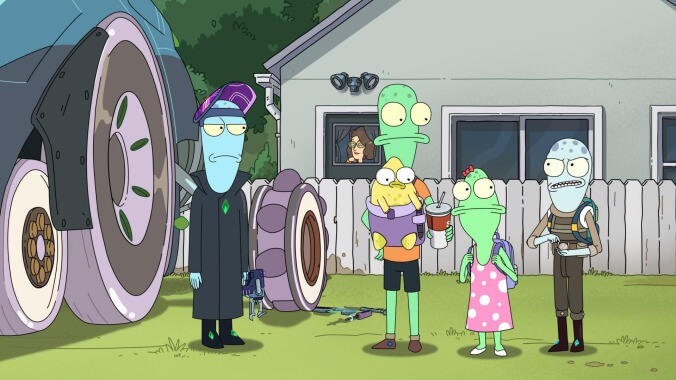It may seem odd to claim that a show that ends multiple episodes with the imprisonment of people in a miniature Escape From New York-esque hellscape is a more humanistic and genteel outing than the previous brainchild of its co-creator, but when comparing a series to the one-of-a-kind Rick And Morty, the usual metrics go out the window. If Solar Opposites demonstrates that the warped comic sensibility of Justin Roiland hasn’t strayed too far from the template he helped establish with his wildly popular Adult Swim program, it also suggests he may have a softer side, one that enjoys indulging in (and yes, often perverting) some of the more classic sitcom tropes. These main characters aren’t even human, but compared to the Smith family, they’re more humane.
Again, however, that’s grading on a curve: Solar Opposites gets plenty weird in its constructions and narrative conceits, as though Roiland and his co-creator (Rick And Morty writer Mike McMahan) were given a firm sitcom structure, then allowed free reign within those confines. The result is a looser, flightier show, one unafraid to follow its whims to narrative dead-ends if it results in good jokes. As a consequence of that open-ended approach, it takes most of the season to get a firm sense of who these characters are, with major personality traits still getting introduced and explored in later episodes. At only eight installments, the first season feels like it’s finding its feet just as it comes to a close. Luckily, the humor is so reliably strong, the pacing so breakneck as it races from one plot to the next, that it’s hard not to be won over by Solar Opposites’ avalanche of charm.
In its opening moments, Korvo seems like he’s going to be a variant on Rick Sanchez’s exasperated egomaniacal genius, chastising his family for wanting to go to the dog park rather than drill to the center of the earth to mine nickel alloy. But it’s soon apparent that Korvo is a far more relatable, everyday sort. Smart but not overly so, often irritating the others with his scolding and obsession with work, he’s also quick to be hurt by a thoughtless act or rude comment, and he and Terry’s odd-couple routine is based in genuine affection and need for warmth and companionship. (The second episode finds them dumping nanobytes into the water supply so they can access data on everyone in their community, in service of trying to make their neighbors like them more.) Plus, their cluelessness about basic aspects of human society gets played for broad laughs (again, shades of 3rd Rock), whether it’s learning TV shows are fictional (Terry’s horrified realization: “If Frasier isn’t real, I’m going to kill myself!”) or misunderstanding the appeal of “man caves” and building a robot wife to nag them about one as a countermeasure.
The look of the show is nigh-interchangeable with its forebear, containing all the hallmarks of Roiland’s cartooning style (and produced via the same company, Toon Boom Harmony), and Solar Opposites is similarly jam-packed with sight-gag shenanigans: While attempting to shoot Korvo with a “dumb ray,” Terry accidentally blasts a dense scientific tome, which transforms into the Bible. One of their neighbors’ man caves is stocked with a Boondock Saints pinball game. And pop culture-loving Terry’s wardrobe is an endless array of nerdy references, like the “Butterbeer Inspector” T-shirt he dons in the second installment. The sound editing is equally layered with deft touches, from the subtle popcorn sound effects the happen when the aliens sweat, to a montage of a murderous robot rampaging through the streets set to Katy Perry’s “Roar.”
The show’s most inventive and interesting addition is also the one that delivers the least comic payoff. At the end of the first episode, it’s revealed that whenever a human annoys Yumyulak, he has a habit of shrinking them down to the size of a finger and depositing them in a glass ecosystem on the wall of his bedroom. Throughout the season, nearly every episode delivers some small subplot set in this miniature realm, where a martial force headed by a sadistic duke controls the populace. (“It’s pretty complicated,” one character explains, only for another to suggest it’s like Escape From New York. “Oh, yeah! Exactly like Escape From New York. Forgot about that movie.”) It all builds to a penultimate episode given over entirely to this story, which unfolds in the precise structure of a Hollywood action movie. It’s fun seeing the show cleverly toy with this convention, but it’s not terribly funny.
But aside from that serialized season-long arc, Solar Opposites is winningly small-scale in its stand-alone episodic ambitions. Burning through plot at a voracious pace, each installment can be enjoyed on its own madcap merits. Fresh, funny, and refreshingly absurd in its willingness to go to goofy places in search of a laugh, the series isn’t trying to reinvent the animated sitcom wheel. It just wants to be a good-natured exercise in warm, witty comedy. It’s already been granted a second season, but there’s no reason this ship shouldn’t remain crashed on Earth for years to come.











![HBO teases new Euphoria, Larry David, and much more in 2026 sizzle reel [Updated]](https://img.pastemagazine.com/wp-content/avuploads/2025/12/12100344/MixCollage-12-Dec-2025-09-56-AM-9137.jpg)






























